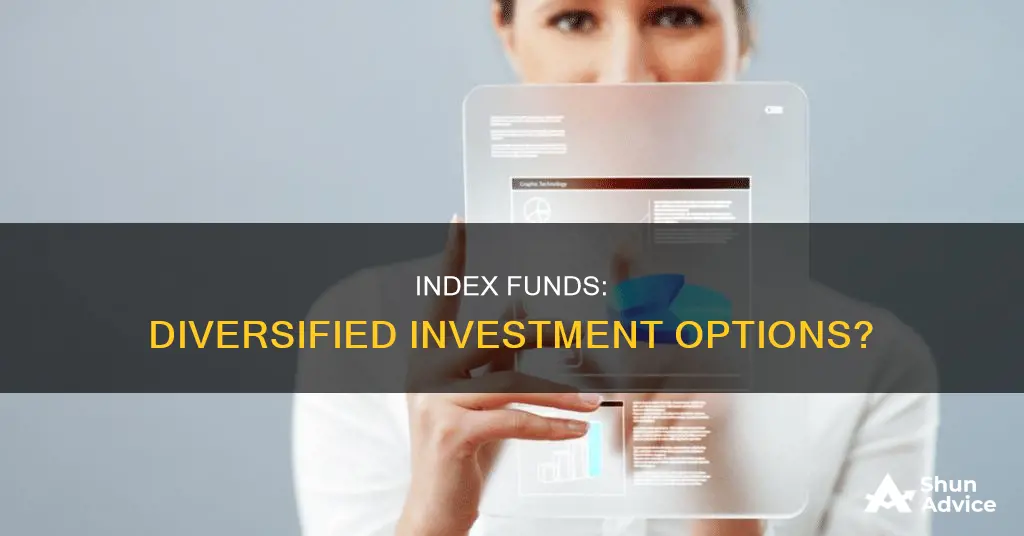
Index funds are a type of mutual or exchange-traded fund (ETF) that tracks the performance of a market index, such as the S&P 500, by holding the same stocks or bonds or a representative sample of them. Index funds are defined as passive investments that mirror the performance of benchmarks like the S&P 500 by mimicking their makeup. Index funds are a popular investment choice due to their broad market exposure and diversification across various sectors and asset classes. They are also associated with lower fees and costs compared to actively managed funds.
| Characteristics | Values |
|---|---|
| Type of fund | Mutual fund or exchange-traded fund (ETF) |
| Investment strategy | Passive, long-term |
| Investment objective | To mirror the performance of a market index |
| Diversification | Low risk due to diversification across various sectors and asset classes |
| Performance | Historically, index funds have outperformed actively managed funds |
| Costs | Lower fees and expenses than actively managed funds |
| Taxes | More tax-efficient than actively managed funds |
| Suitability | Suitable for beginners and long-term investors |
What You'll Learn

Index funds are a type of mutual or exchange-traded fund (ETF)
Index funds are considered an attractive investment option for several reasons, including diversification and low expense ratios. When you purchase shares of an index fund, you are exposed to all the stocks in an index, meaning that stocks that are appreciating will make up for stocks that are depreciating. Index funds are also more affordable for the average investor, as they pool money from thousands of investors to buy a large number of stocks.
Index funds are available in both mutual fund and ETF forms. Mutual funds pool money to buy a portfolio of stocks or bonds, and investors buy shares directly from the mutual fund company at the net asset value (NAV) price, calculated at the end of each trading day. ETFs, on the other hand, are traded on exchanges like individual stocks, allowing investors to employ more trading strategies, such as timing ETF share trades and short selling.
When choosing an index fund, it is important to consider factors such as the fund's expenses, taxes, and investment minimums. Index funds are generally cheaper to run than actively managed funds, as they are automated to follow shifts in value in an index and do not require a team of analysts and portfolio managers. However, it is important to note that not all index mutual funds are cheap, and they still carry administrative costs that are subtracted from each fund shareholder's returns.
Overall, index funds offer investors a low-cost, easy way to build wealth and are a popular choice for those seeking low-cost, diversified, and passive investments that can outperform higher-fee, actively traded funds.
Tata AIA Multi-Cap Fund: Smart Investment Strategy
You may want to see also

They track the performance of a market index, like the S&P 500
Index funds are a type of mutual or exchange-traded fund (ETF) that tracks the performance of a market index, such as the S&P 500, by holding the same stocks or bonds or a representative sample of them. Index funds are defined as investments that mirror the performance of benchmarks like the S&P 500 by mimicking their makeup.
The S&P 500 Index, or Standard & Poor's 500 Index, is a market-capitalization-weighted index of 500 leading publicly traded companies in the U.S. It is one of the most commonly followed equity indices and includes approximately 80% of the total market capitalization of U.S. public companies, with an aggregate market cap of more than $43 trillion as of January 2024. The index includes 503 components because three companies have two share classes listed.
The S&P 500 is considered the best overall benchmark of how the U.S. stock market is doing. It is a statistical measure of the performance of America's 500 largest stocks and is a common benchmark against which portfolio performance can be evaluated. The index is weighted by market capitalization (share price multiplied by the number of shares outstanding), meaning that a company's valuation determines its influence on the index's performance.
Index funds that track the S&P 500 include the Vanguard S&P 500 ETF, SPDR S&P 500 ETF Trust, iShares Core S&P 500 ETF, and the Schwab S&P 500 Index Fund. These funds are traded on exchanges like individual stocks, allowing investors to employ a variety of trading strategies.
Strategies for Investing in Third Point Hedge Fund
You may want to see also

Index funds are a passive investment strategy
Index funds are passive investments, which means they are designed to mirror the performance of a financial market index. This is in contrast to active investments, where a fund manager actively selects stocks or other investments.
Index funds are a popular investment strategy because they offer a simple, low-cost way to gain exposure to a broad, diversified portfolio. They are also considered safer than investing in individual stocks because they are diversified, meaning they hold a wide range of stocks across various sectors and industries. This reduces the risk of losing money if a single company performs poorly.
Index funds are also attractive because they have lower fees than actively managed funds. This is because index fund managers simply replicate the performance of a benchmark index, so they don't need to spend time and money on research and analysis. As a result, they can charge lower expense ratios, which means higher returns for investors.
Another advantage of index funds is that they are tax-efficient. Because index funds don't buy and sell their holdings as frequently as actively managed funds, they generate fewer capital gains that can add to an investor's tax bill.
Overall, index funds are a passive investment strategy that offers a simple, low-cost way to gain exposure to a diversified portfolio of stocks or other investments. They are a popular choice for investors, especially beginners, because they provide a way to build wealth over the long term without the need for extensive investment knowledge or active management.
Vanguard Funds: Minimum Investment Requirements and Options
You may want to see also

They are a low-cost way to track a specific group of investments
Index funds are a low-cost way to track a specific group of investments. They are passively managed, meaning they do not require active fund managers to pick and choose investments. This lack of active management keeps costs low.
Index funds are a type of mutual or exchange-traded fund (ETF) that tracks the performance of a market index, such as the S&P 500, by holding the same stocks or bonds or a representative sample of them. They are defined as investments that mirror the performance of benchmarks like the S&P 500 by mimicking their makeup.
Because they are passively managed, index funds have lower expenses and fees than actively managed funds. They also trade less frequently, resulting in fewer transaction fees and commissions. This makes them an attractive option for investors looking for a low-cost way to track a specific group of investments.
Index funds are also more diversified than individual stocks, as they hold a broad range of stocks or bonds. This diversification can help to reduce risk and provide more stable returns over time.
When choosing an index fund, it is important to consider the fund's costs, performance, and the specific index it tracks. Some popular indexes tracked by index funds include the S&P 500, Dow Jones Industrial Average, Nasdaq Composite, and Russell 2000.
Index funds can be purchased directly from a mutual fund company or a brokerage, or through a broker. It is important to compare costs and features when deciding where to buy index fund shares. Some brokers charge extra for customers to buy index fund shares, so it may be cheaper to go directly through the index fund company.
Overall, index funds offer a low-cost way to track a specific group of investments, making them a popular choice for investors looking for a simple and cost-effective way to invest.
Hayman Capital Master Fund: A Smart Investment Strategy
You may want to see also

Index funds are considered safer than individual stocks
Index funds are generally considered safer than individual stocks due to their inherent diversification. They are a type of investment fund that tracks the performance of a specific market index, such as the S&P 500, by holding a broad range of stocks or bonds that make up that index. This diversification across various sectors and asset classes helps to reduce risk and provide broader market exposure.
Diversification:
When you invest in an index fund, you are investing in a basket of stocks or bonds that make up the underlying index. This means that your investment is automatically diversified across a wide range of companies and industries. In contrast, investing in individual stocks can concentrate your risk in a few specific companies, which may be more vulnerable to market downturns or negative events affecting those companies.
Lower Fees and Costs:
Index funds are passively managed, meaning they aim to replicate the performance of an index without actively selecting stocks. This passive management strategy leads to lower fees and expenses compared to actively managed funds. Actively managed funds have higher costs because they employ fund managers and analysts who actively research and select investments, trying to "beat the market". However, these higher costs do not always translate into better returns.
Historical Performance:
Index funds have a strong track record of performance over the long term. For example, the S&P 500 index has historically averaged an annual return of around 10%. While individual stocks may provide higher returns during bull markets, they also carry a higher risk of significant losses. Index funds, due to their diversification, tend to provide more consistent returns over time.
Simplicity and Accessibility:
Index funds are straightforward investment vehicles that are suitable for both beginner and experienced investors. They do not require extensive research or financial expertise to select individual stocks. Additionally, index funds are widely accessible, with many options available through online brokerage platforms or directly from fund companies.
Risk Management:
The diversification inherent in index funds helps to manage risk. If a single company in the index performs poorly, its impact on the overall fund is minimal. In contrast, a poor performance by an individual stock in your portfolio can have a significant negative effect.
While index funds are generally considered safer than individual stocks, it is important to remember that they are not completely risk-free. They are still subject to market volatility and can lose value during downturns. However, their diversification and low costs make them a more conservative investment option for those seeking long-term growth.
Robinhood Market Fund Investment: A Beginner's Guide
You may want to see also
Frequently asked questions
An index fund is a type of mutual or exchange-traded fund (ETF) that tracks the performance of a market index, such as the S&P 500, by holding the same stocks or bonds or a representative sample of them. Index funds are defined as passive investments that mirror the performance of benchmarks like the S&P 500 by mimicking their makeup.
Index funds are a low-cost way to track a specific group of investments, which can be more broadly diversified than individual stocks and simpler to buy than each of the individual holdings within the index. They are passively managed and have lower expenses and fees than actively managed funds. Index funds are also quite tax-efficient compared to many other investments.
What are the risks of investing in index funds?







